Concept of Corporate Social Responsibility- Report
VerifiedAdded on 2022/07/29
|7
|1509
|25
AI Summary
Your task is to prepare a critical literature review based on your Assessment 2 problem statement. The materials on writing a critical literature review will be covered during Week 3 of the unit. This assessment requires you to: 1. Present your problem statement from Assessment 2. 2. Write a critical literature review (length up to 1000 words excluding reference list) that evaluates a minimum of five (9) references from the academic literature (books and/or academic journal articles) relevant to your research idea. 3. Provide a reference list using the Harvard referencing system. Marking criteria 1. Range, relevancy and quality of literature related to the research question 35% 2. Development of a well-structured, critical argument 40% 3. Clarity of expression throughout the review 15% 4. Referencing (within review and reference list) 10%.
Contribute Materials
Your contribution can guide someone’s learning journey. Share your
documents today.
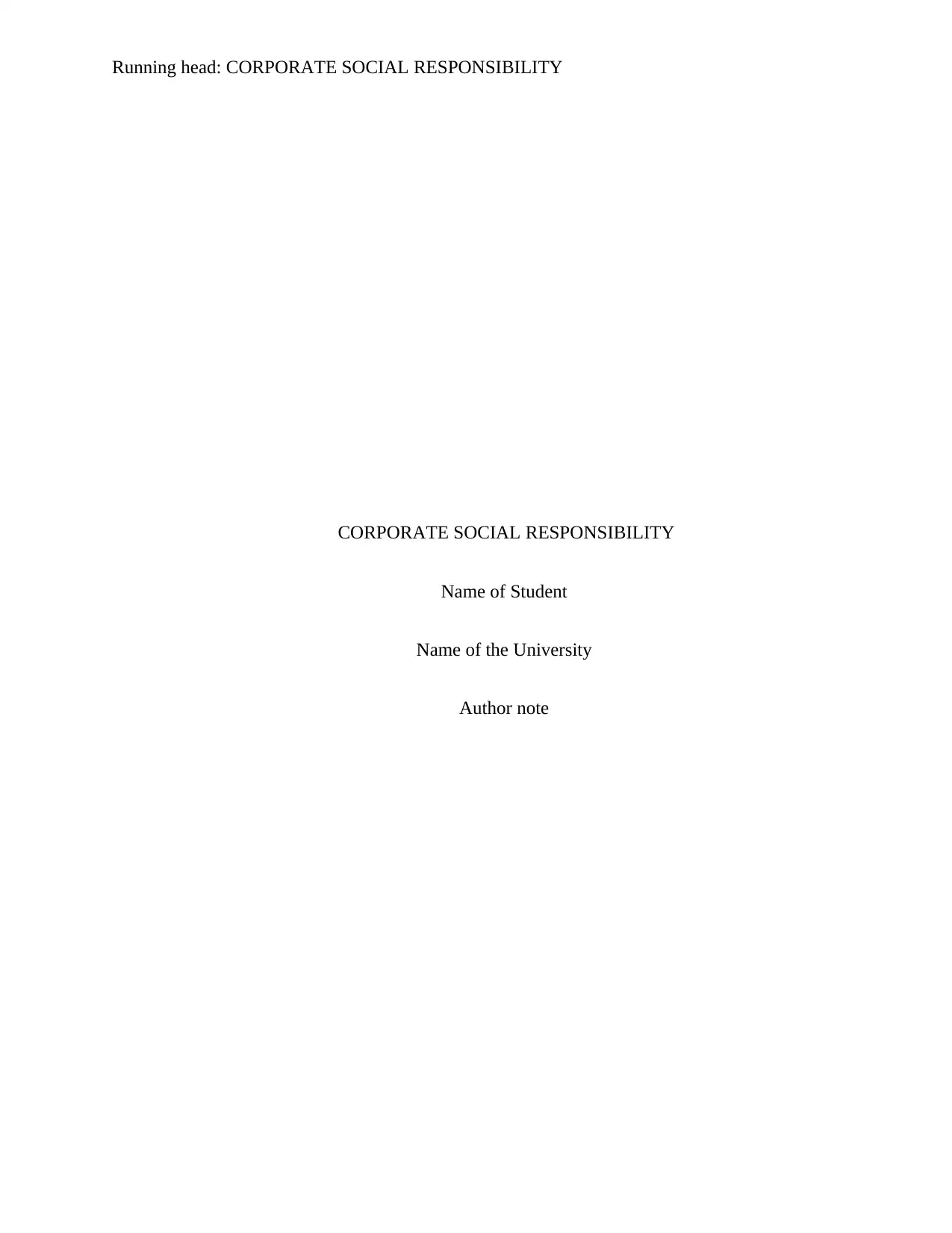
Running head: CORPORATE SOCIAL RESPONSIBILITY
CORPORATE SOCIAL RESPONSIBILITY
Name of Student
Name of the University
Author note
CORPORATE SOCIAL RESPONSIBILITY
Name of Student
Name of the University
Author note
Secure Best Marks with AI Grader
Need help grading? Try our AI Grader for instant feedback on your assignments.
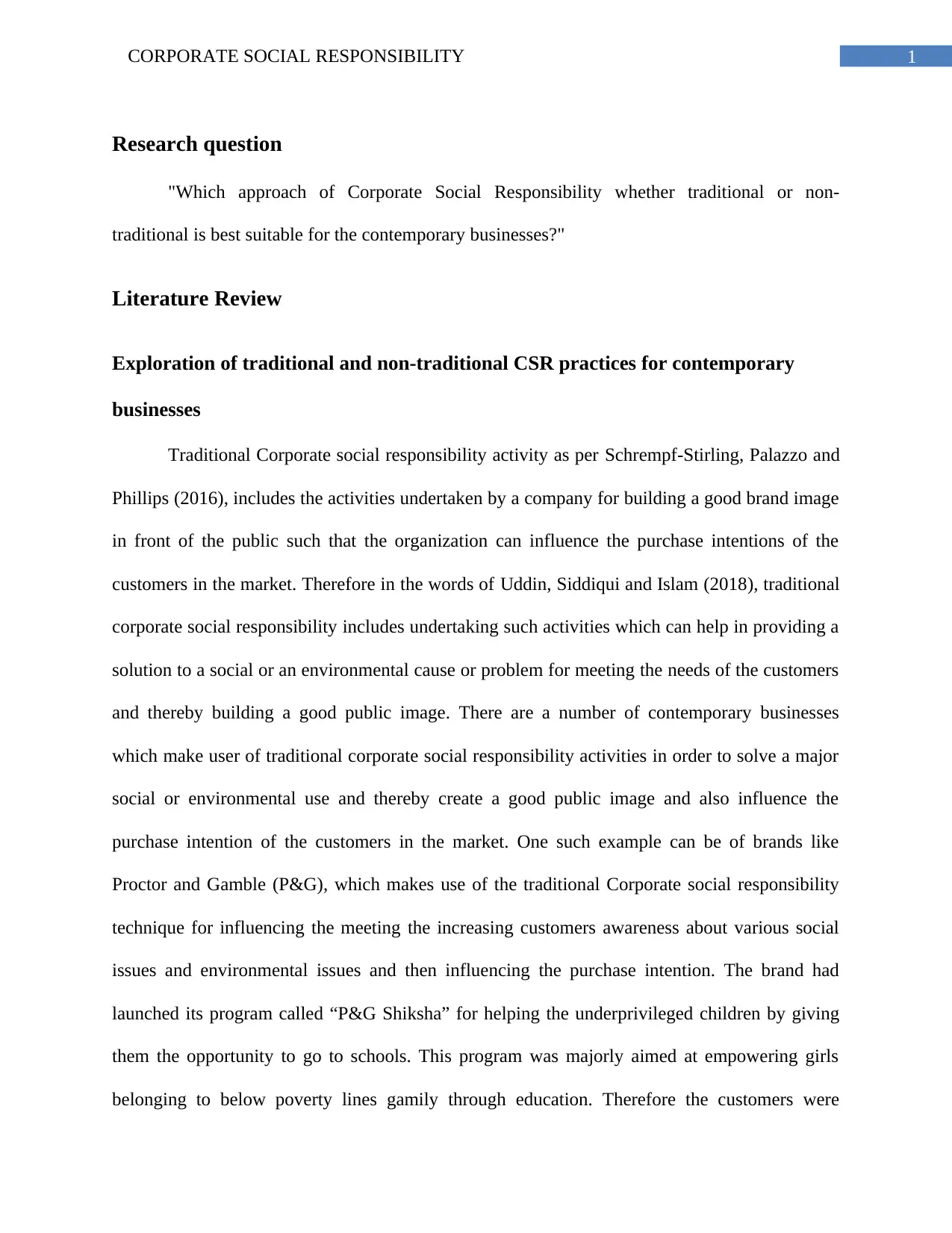
1CORPORATE SOCIAL RESPONSIBILITY
Research question
"Which approach of Corporate Social Responsibility whether traditional or non-
traditional is best suitable for the contemporary businesses?"
Literature Review
Exploration of traditional and non-traditional CSR practices for contemporary
businesses
Traditional Corporate social responsibility activity as per Schrempf-Stirling, Palazzo and
Phillips (2016), includes the activities undertaken by a company for building a good brand image
in front of the public such that the organization can influence the purchase intentions of the
customers in the market. Therefore in the words of Uddin, Siddiqui and Islam (2018), traditional
corporate social responsibility includes undertaking such activities which can help in providing a
solution to a social or an environmental cause or problem for meeting the needs of the customers
and thereby building a good public image. There are a number of contemporary businesses
which make user of traditional corporate social responsibility activities in order to solve a major
social or environmental use and thereby create a good public image and also influence the
purchase intention of the customers in the market. One such example can be of brands like
Proctor and Gamble (P&G), which makes use of the traditional Corporate social responsibility
technique for influencing the meeting the increasing customers awareness about various social
issues and environmental issues and then influencing the purchase intention. The brand had
launched its program called “P&G Shiksha” for helping the underprivileged children by giving
them the opportunity to go to schools. This program was majorly aimed at empowering girls
belonging to below poverty lines gamily through education. Therefore the customers were
Research question
"Which approach of Corporate Social Responsibility whether traditional or non-
traditional is best suitable for the contemporary businesses?"
Literature Review
Exploration of traditional and non-traditional CSR practices for contemporary
businesses
Traditional Corporate social responsibility activity as per Schrempf-Stirling, Palazzo and
Phillips (2016), includes the activities undertaken by a company for building a good brand image
in front of the public such that the organization can influence the purchase intentions of the
customers in the market. Therefore in the words of Uddin, Siddiqui and Islam (2018), traditional
corporate social responsibility includes undertaking such activities which can help in providing a
solution to a social or an environmental cause or problem for meeting the needs of the customers
and thereby building a good public image. There are a number of contemporary businesses
which make user of traditional corporate social responsibility activities in order to solve a major
social or environmental use and thereby create a good public image and also influence the
purchase intention of the customers in the market. One such example can be of brands like
Proctor and Gamble (P&G), which makes use of the traditional Corporate social responsibility
technique for influencing the meeting the increasing customers awareness about various social
issues and environmental issues and then influencing the purchase intention. The brand had
launched its program called “P&G Shiksha” for helping the underprivileged children by giving
them the opportunity to go to schools. This program was majorly aimed at empowering girls
belonging to below poverty lines gamily through education. Therefore the customers were
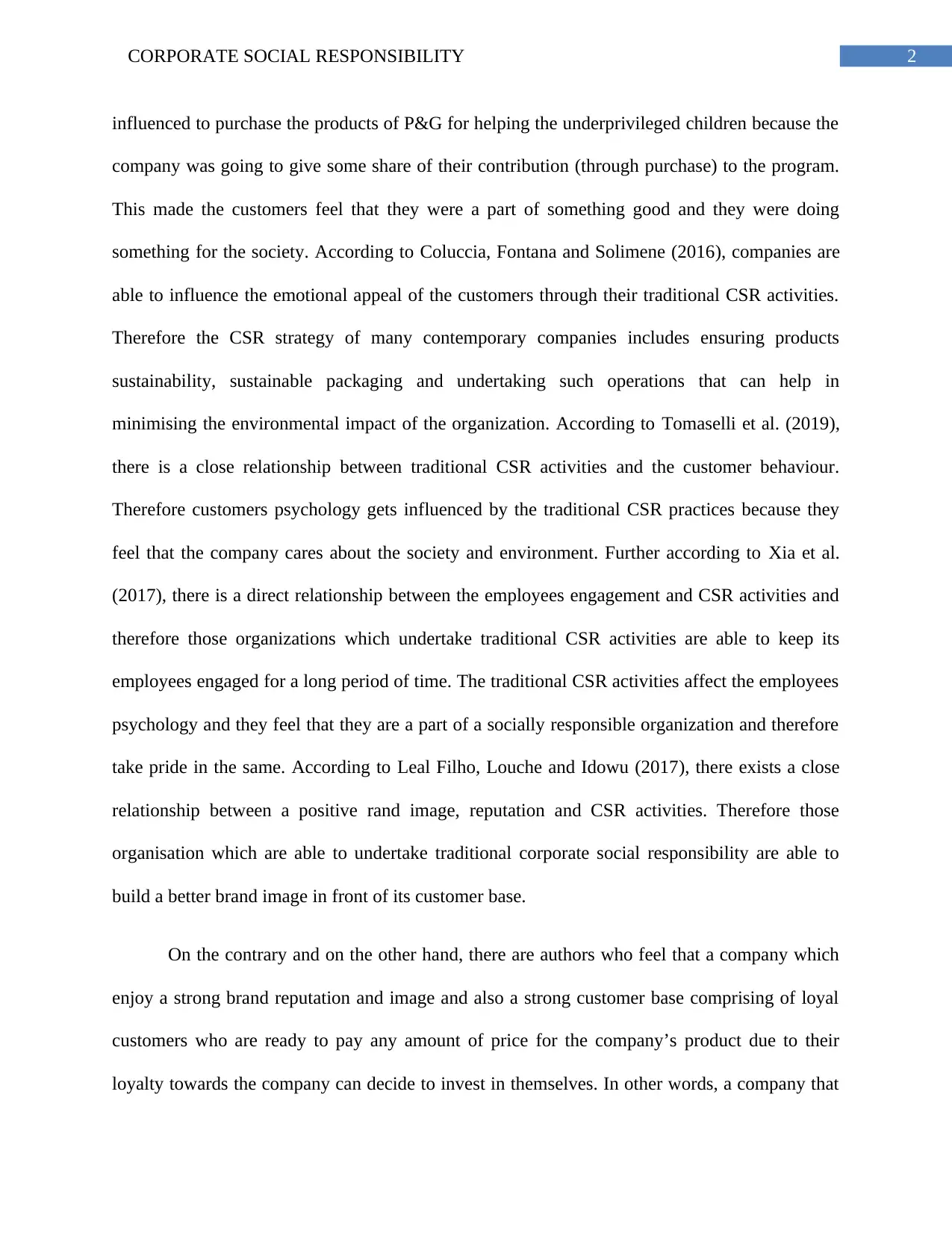
2CORPORATE SOCIAL RESPONSIBILITY
influenced to purchase the products of P&G for helping the underprivileged children because the
company was going to give some share of their contribution (through purchase) to the program.
This made the customers feel that they were a part of something good and they were doing
something for the society. According to Coluccia, Fontana and Solimene (2016), companies are
able to influence the emotional appeal of the customers through their traditional CSR activities.
Therefore the CSR strategy of many contemporary companies includes ensuring products
sustainability, sustainable packaging and undertaking such operations that can help in
minimising the environmental impact of the organization. According to Tomaselli et al. (2019),
there is a close relationship between traditional CSR activities and the customer behaviour.
Therefore customers psychology gets influenced by the traditional CSR practices because they
feel that the company cares about the society and environment. Further according to Xia et al.
(2017), there is a direct relationship between the employees engagement and CSR activities and
therefore those organizations which undertake traditional CSR activities are able to keep its
employees engaged for a long period of time. The traditional CSR activities affect the employees
psychology and they feel that they are a part of a socially responsible organization and therefore
take pride in the same. According to Leal Filho, Louche and Idowu (2017), there exists a close
relationship between a positive rand image, reputation and CSR activities. Therefore those
organisation which are able to undertake traditional corporate social responsibility are able to
build a better brand image in front of its customer base.
On the contrary and on the other hand, there are authors who feel that a company which
enjoy a strong brand reputation and image and also a strong customer base comprising of loyal
customers who are ready to pay any amount of price for the company’s product due to their
loyalty towards the company can decide to invest in themselves. In other words, a company that
influenced to purchase the products of P&G for helping the underprivileged children because the
company was going to give some share of their contribution (through purchase) to the program.
This made the customers feel that they were a part of something good and they were doing
something for the society. According to Coluccia, Fontana and Solimene (2016), companies are
able to influence the emotional appeal of the customers through their traditional CSR activities.
Therefore the CSR strategy of many contemporary companies includes ensuring products
sustainability, sustainable packaging and undertaking such operations that can help in
minimising the environmental impact of the organization. According to Tomaselli et al. (2019),
there is a close relationship between traditional CSR activities and the customer behaviour.
Therefore customers psychology gets influenced by the traditional CSR practices because they
feel that the company cares about the society and environment. Further according to Xia et al.
(2017), there is a direct relationship between the employees engagement and CSR activities and
therefore those organizations which undertake traditional CSR activities are able to keep its
employees engaged for a long period of time. The traditional CSR activities affect the employees
psychology and they feel that they are a part of a socially responsible organization and therefore
take pride in the same. According to Leal Filho, Louche and Idowu (2017), there exists a close
relationship between a positive rand image, reputation and CSR activities. Therefore those
organisation which are able to undertake traditional corporate social responsibility are able to
build a better brand image in front of its customer base.
On the contrary and on the other hand, there are authors who feel that a company which
enjoy a strong brand reputation and image and also a strong customer base comprising of loyal
customers who are ready to pay any amount of price for the company’s product due to their
loyalty towards the company can decide to invest in themselves. In other words, a company that
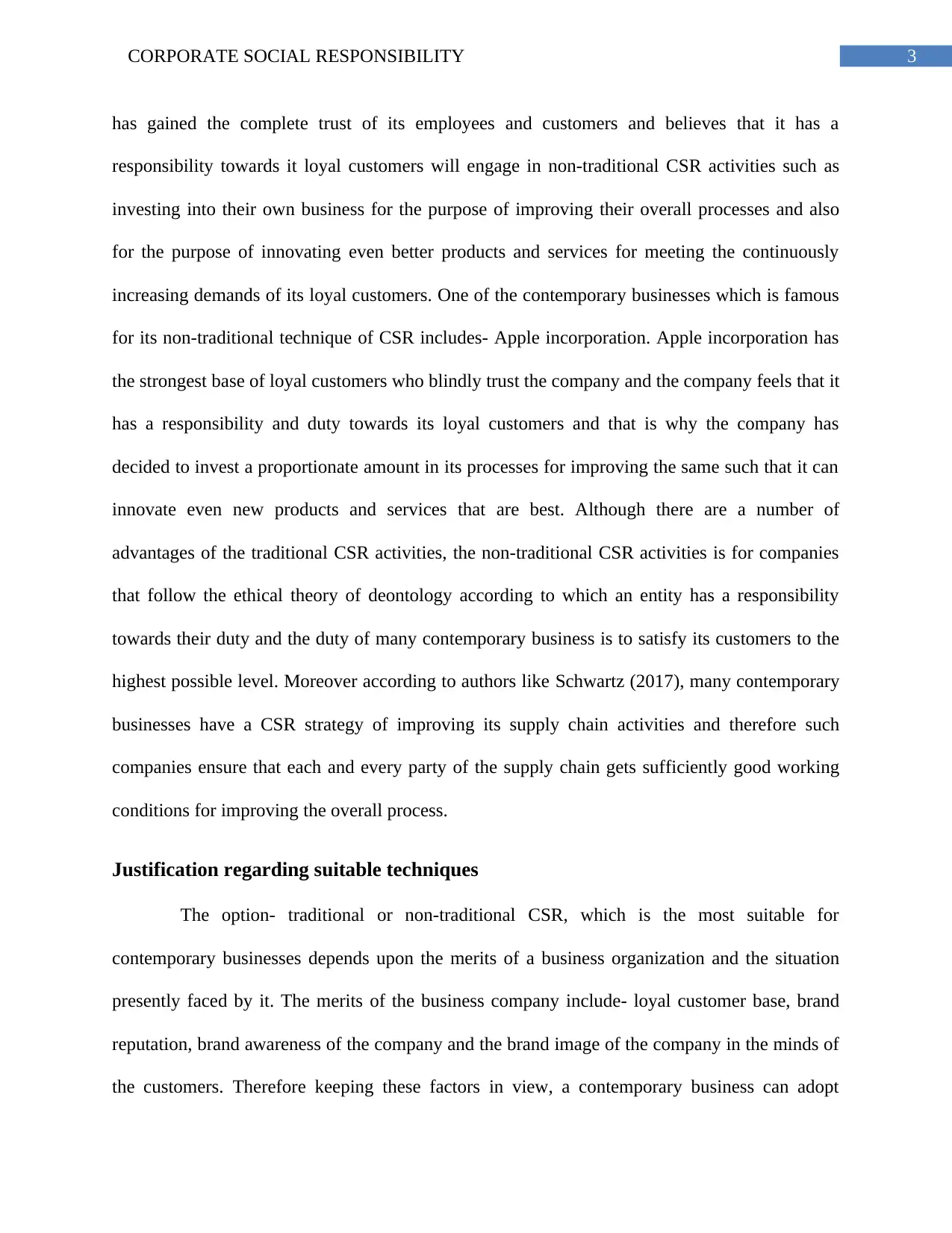
3CORPORATE SOCIAL RESPONSIBILITY
has gained the complete trust of its employees and customers and believes that it has a
responsibility towards it loyal customers will engage in non-traditional CSR activities such as
investing into their own business for the purpose of improving their overall processes and also
for the purpose of innovating even better products and services for meeting the continuously
increasing demands of its loyal customers. One of the contemporary businesses which is famous
for its non-traditional technique of CSR includes- Apple incorporation. Apple incorporation has
the strongest base of loyal customers who blindly trust the company and the company feels that it
has a responsibility and duty towards its loyal customers and that is why the company has
decided to invest a proportionate amount in its processes for improving the same such that it can
innovate even new products and services that are best. Although there are a number of
advantages of the traditional CSR activities, the non-traditional CSR activities is for companies
that follow the ethical theory of deontology according to which an entity has a responsibility
towards their duty and the duty of many contemporary business is to satisfy its customers to the
highest possible level. Moreover according to authors like Schwartz (2017), many contemporary
businesses have a CSR strategy of improving its supply chain activities and therefore such
companies ensure that each and every party of the supply chain gets sufficiently good working
conditions for improving the overall process.
Justification regarding suitable techniques
The option- traditional or non-traditional CSR, which is the most suitable for
contemporary businesses depends upon the merits of a business organization and the situation
presently faced by it. The merits of the business company include- loyal customer base, brand
reputation, brand awareness of the company and the brand image of the company in the minds of
the customers. Therefore keeping these factors in view, a contemporary business can adopt
has gained the complete trust of its employees and customers and believes that it has a
responsibility towards it loyal customers will engage in non-traditional CSR activities such as
investing into their own business for the purpose of improving their overall processes and also
for the purpose of innovating even better products and services for meeting the continuously
increasing demands of its loyal customers. One of the contemporary businesses which is famous
for its non-traditional technique of CSR includes- Apple incorporation. Apple incorporation has
the strongest base of loyal customers who blindly trust the company and the company feels that it
has a responsibility and duty towards its loyal customers and that is why the company has
decided to invest a proportionate amount in its processes for improving the same such that it can
innovate even new products and services that are best. Although there are a number of
advantages of the traditional CSR activities, the non-traditional CSR activities is for companies
that follow the ethical theory of deontology according to which an entity has a responsibility
towards their duty and the duty of many contemporary business is to satisfy its customers to the
highest possible level. Moreover according to authors like Schwartz (2017), many contemporary
businesses have a CSR strategy of improving its supply chain activities and therefore such
companies ensure that each and every party of the supply chain gets sufficiently good working
conditions for improving the overall process.
Justification regarding suitable techniques
The option- traditional or non-traditional CSR, which is the most suitable for
contemporary businesses depends upon the merits of a business organization and the situation
presently faced by it. The merits of the business company include- loyal customer base, brand
reputation, brand awareness of the company and the brand image of the company in the minds of
the customers. Therefore keeping these factors in view, a contemporary business can adopt
Secure Best Marks with AI Grader
Need help grading? Try our AI Grader for instant feedback on your assignments.
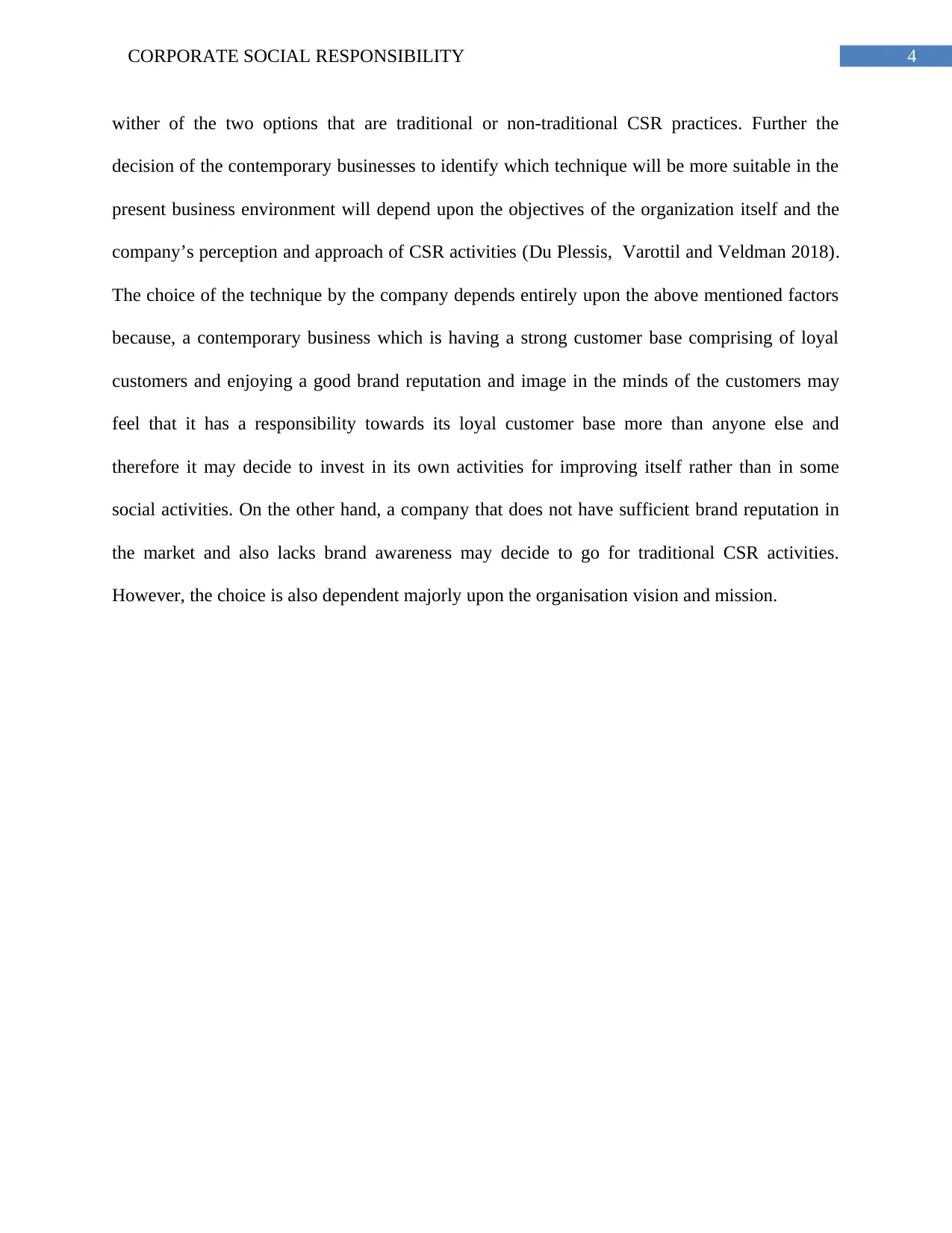
4CORPORATE SOCIAL RESPONSIBILITY
wither of the two options that are traditional or non-traditional CSR practices. Further the
decision of the contemporary businesses to identify which technique will be more suitable in the
present business environment will depend upon the objectives of the organization itself and the
company’s perception and approach of CSR activities (Du Plessis, Varottil and Veldman 2018).
The choice of the technique by the company depends entirely upon the above mentioned factors
because, a contemporary business which is having a strong customer base comprising of loyal
customers and enjoying a good brand reputation and image in the minds of the customers may
feel that it has a responsibility towards its loyal customer base more than anyone else and
therefore it may decide to invest in its own activities for improving itself rather than in some
social activities. On the other hand, a company that does not have sufficient brand reputation in
the market and also lacks brand awareness may decide to go for traditional CSR activities.
However, the choice is also dependent majorly upon the organisation vision and mission.
wither of the two options that are traditional or non-traditional CSR practices. Further the
decision of the contemporary businesses to identify which technique will be more suitable in the
present business environment will depend upon the objectives of the organization itself and the
company’s perception and approach of CSR activities (Du Plessis, Varottil and Veldman 2018).
The choice of the technique by the company depends entirely upon the above mentioned factors
because, a contemporary business which is having a strong customer base comprising of loyal
customers and enjoying a good brand reputation and image in the minds of the customers may
feel that it has a responsibility towards its loyal customer base more than anyone else and
therefore it may decide to invest in its own activities for improving itself rather than in some
social activities. On the other hand, a company that does not have sufficient brand reputation in
the market and also lacks brand awareness may decide to go for traditional CSR activities.
However, the choice is also dependent majorly upon the organisation vision and mission.
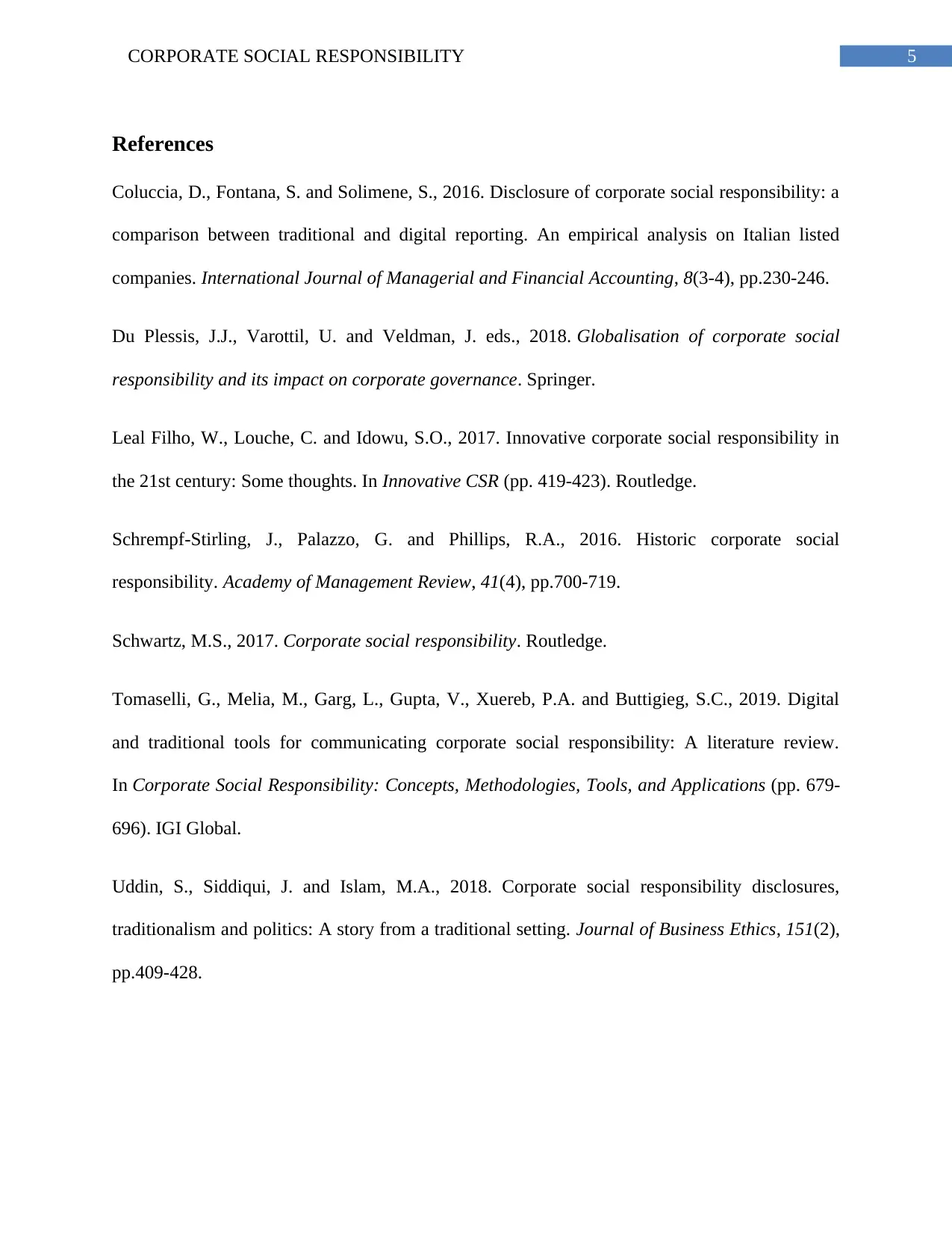
5CORPORATE SOCIAL RESPONSIBILITY
References
Coluccia, D., Fontana, S. and Solimene, S., 2016. Disclosure of corporate social responsibility: a
comparison between traditional and digital reporting. An empirical analysis on Italian listed
companies. International Journal of Managerial and Financial Accounting, 8(3-4), pp.230-246.
Du Plessis, J.J., Varottil, U. and Veldman, J. eds., 2018. Globalisation of corporate social
responsibility and its impact on corporate governance. Springer.
Leal Filho, W., Louche, C. and Idowu, S.O., 2017. Innovative corporate social responsibility in
the 21st century: Some thoughts. In Innovative CSR (pp. 419-423). Routledge.
Schrempf-Stirling, J., Palazzo, G. and Phillips, R.A., 2016. Historic corporate social
responsibility. Academy of Management Review, 41(4), pp.700-719.
Schwartz, M.S., 2017. Corporate social responsibility. Routledge.
Tomaselli, G., Melia, M., Garg, L., Gupta, V., Xuereb, P.A. and Buttigieg, S.C., 2019. Digital
and traditional tools for communicating corporate social responsibility: A literature review.
In Corporate Social Responsibility: Concepts, Methodologies, Tools, and Applications (pp. 679-
696). IGI Global.
Uddin, S., Siddiqui, J. and Islam, M.A., 2018. Corporate social responsibility disclosures,
traditionalism and politics: A story from a traditional setting. Journal of Business Ethics, 151(2),
pp.409-428.
References
Coluccia, D., Fontana, S. and Solimene, S., 2016. Disclosure of corporate social responsibility: a
comparison between traditional and digital reporting. An empirical analysis on Italian listed
companies. International Journal of Managerial and Financial Accounting, 8(3-4), pp.230-246.
Du Plessis, J.J., Varottil, U. and Veldman, J. eds., 2018. Globalisation of corporate social
responsibility and its impact on corporate governance. Springer.
Leal Filho, W., Louche, C. and Idowu, S.O., 2017. Innovative corporate social responsibility in
the 21st century: Some thoughts. In Innovative CSR (pp. 419-423). Routledge.
Schrempf-Stirling, J., Palazzo, G. and Phillips, R.A., 2016. Historic corporate social
responsibility. Academy of Management Review, 41(4), pp.700-719.
Schwartz, M.S., 2017. Corporate social responsibility. Routledge.
Tomaselli, G., Melia, M., Garg, L., Gupta, V., Xuereb, P.A. and Buttigieg, S.C., 2019. Digital
and traditional tools for communicating corporate social responsibility: A literature review.
In Corporate Social Responsibility: Concepts, Methodologies, Tools, and Applications (pp. 679-
696). IGI Global.
Uddin, S., Siddiqui, J. and Islam, M.A., 2018. Corporate social responsibility disclosures,
traditionalism and politics: A story from a traditional setting. Journal of Business Ethics, 151(2),
pp.409-428.
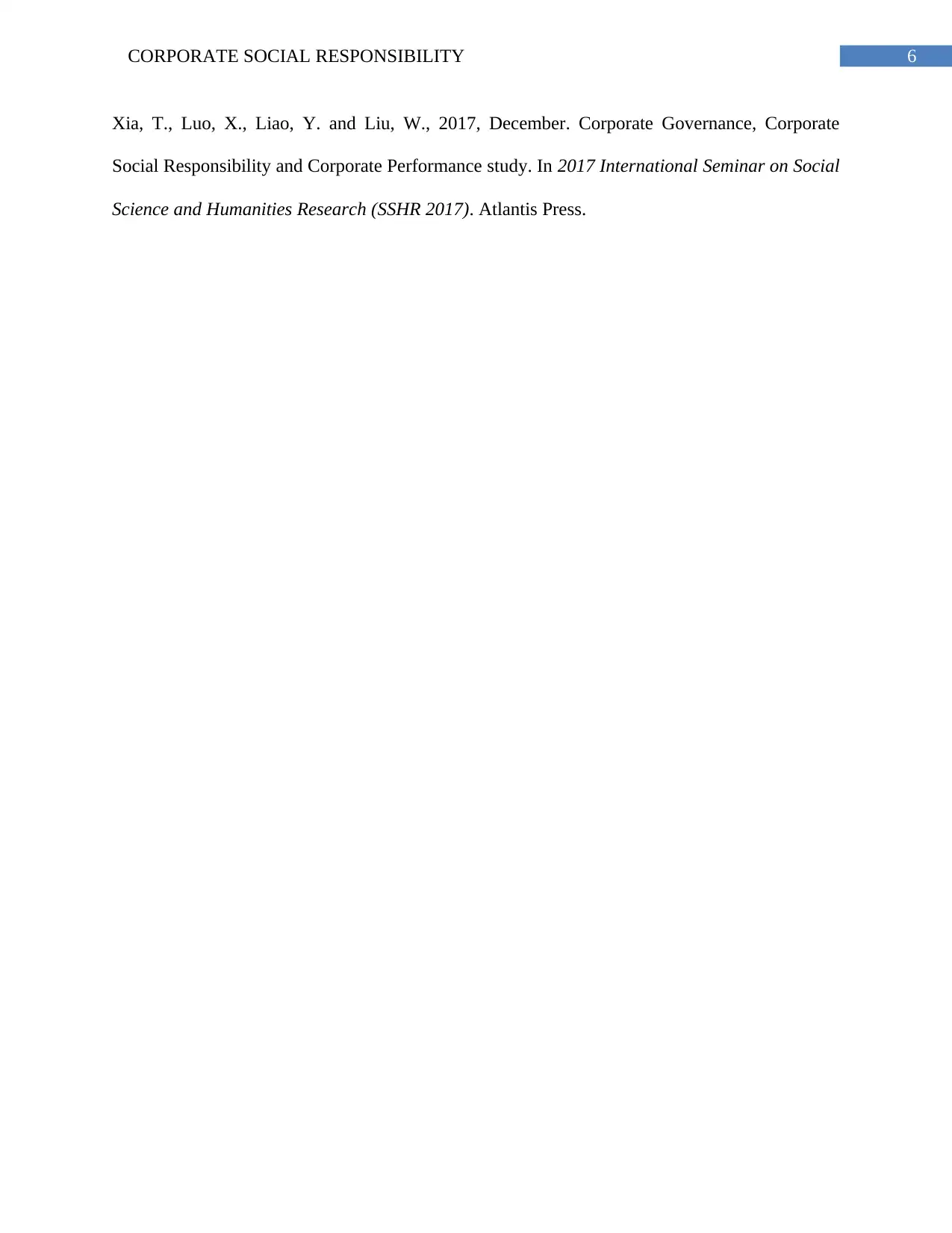
6CORPORATE SOCIAL RESPONSIBILITY
Xia, T., Luo, X., Liao, Y. and Liu, W., 2017, December. Corporate Governance, Corporate
Social Responsibility and Corporate Performance study. In 2017 International Seminar on Social
Science and Humanities Research (SSHR 2017). Atlantis Press.
Xia, T., Luo, X., Liao, Y. and Liu, W., 2017, December. Corporate Governance, Corporate
Social Responsibility and Corporate Performance study. In 2017 International Seminar on Social
Science and Humanities Research (SSHR 2017). Atlantis Press.
1 out of 7
Related Documents
Your All-in-One AI-Powered Toolkit for Academic Success.
+13062052269
info@desklib.com
Available 24*7 on WhatsApp / Email
![[object Object]](/_next/static/media/star-bottom.7253800d.svg)
Unlock your academic potential
© 2024 | Zucol Services PVT LTD | All rights reserved.





